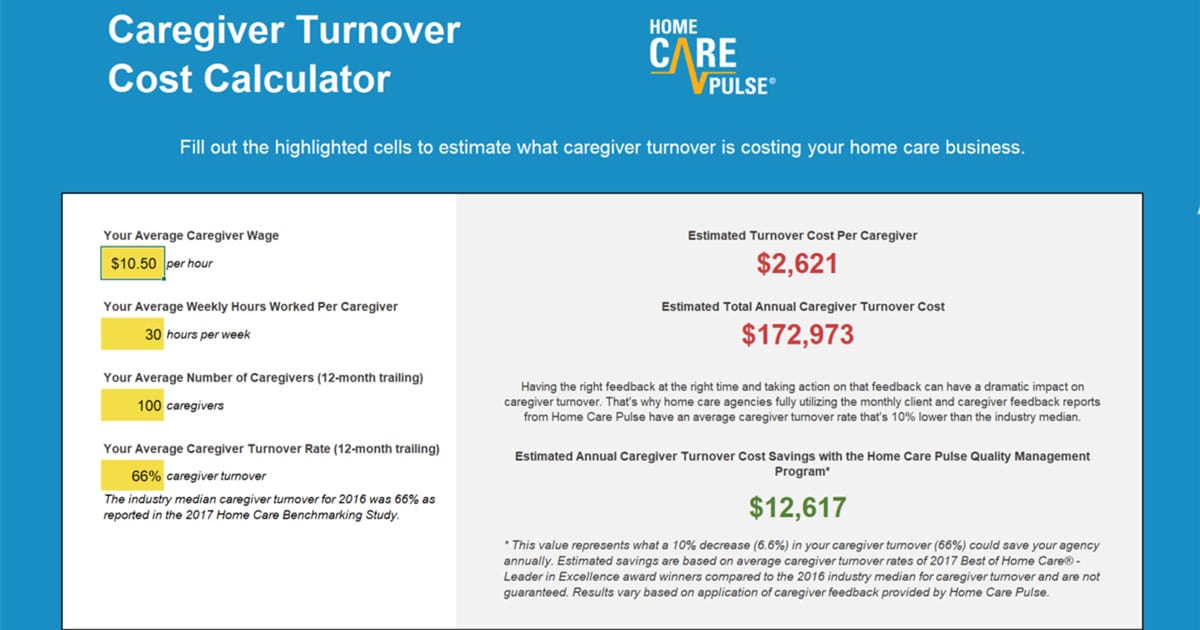Do you know what care professional turnover is really costing your home care agency?
Download our free caregiver turnover cost calculator.
Estimate your individual and annual care professional turnover costs, and learn how changes in your care professional turnover can impact your total annual care professional turnover costs.

Learn how Home Care Pulse helps agencies fight turnover with powerful, monthly client and care professional feedback.
Understand How Your Care Professional Satisfaction Trends Impact Your Business
Understand the unique needs of your care professionals with the ability to track satisfaction trends across seven distinct categories including likelihood to recommend employment, training received, and client-caregiver compatibility. Pinpoint your strengths and weaknesses and compare your ratings against the rest of the home care industry in your region to see how you stack up.

Discover the True Reasons Why Your Care Professionals Leave and Why They Stay
Get direct feedback from your care professionals each month so you can pinpoint what’s working and what’s not. Gather care professional testimonials and detailed feedback and analyze your care professional satisfaction with monthly reports to guide your retention efforts.
Real Care Professional Feedback:The training I received was very professional. It was beneficial because when I went to orientation, they explained everything step-by-step so I could understand it.
Real Care Professional Feedback:My employer just sends me to my clients. They don’t match me. I would like them to consider my location when matching.
Real Care Professional Feedback:My supervisor is really busy so I don’t get to speak with them often. I would really appreciate it if my supervisor reached out and asked for ideas more often.
Earn Awards That Attract Top Care Professionals
Based on monthly satisfaction scores from your care professionals, earn recognitions including the prestigious Best of Home Care® Employer of Choice Award. Use your awards to attract the best care professionals, stand out from your competition, build trust with your referral sources, and showcase your awards on your bestofhomecare.com and caring.com listings.

See How Home Care Agencies Are Using Our Platform
See how home care business owners and executives use Home Care Pulse to close the feedback loop, boost client and care professional satisfaction, earn referrals, and reduce turnover.
Ready To See How Home Care Pulse Can Transform Your Business?
Connect with an expert from our team and discover how unbiased, client and care professional feedback can transform your business, help you reduce care professional turnover, and increase satisfaction. We’ll walk you through our online dashboard where you can review monthly feedback and get incredible insights into your home care business.
FAQs
How does Home Care Pulse capture detailed client and care professional feedback?
From our in-house, US-based call center, we perform live telephone interviews with care professionals and clients (or a designated party). During the short interview, we capture satisfaction ratings across multiple areas of your business and transcribe feedback.
What if I have less than 10 clients?
If you have less than 10 clients or less than 10 care professionals, your agency may not be a good match for our program just yet. Having at least 10 clients or 10 care professionals helps ensure that we can gather feedback on an ongoing basis.
Does Home Care Pulse provide leads?
No. Home Care Pulse doesn’t currently provide paid leads. However, the home care agencies we work with are using their Best of Home Care awards and client feedback reports to attract more business and close more sales.
How often are my clients and care professionals called?
Clients and care professionals are interviewed monthly. Once an individual has completed an interview, we won’t attempt to contact them again for at least six months.



